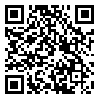شنبه 12 آبان 1403
[Archive]
دوره 9، شماره 2 - ( 1-1400 )
جلد 9 شماره 2 صفحات 110-103 |
برگشت به فهرست نسخه ها
Download citation:
BibTeX | RIS | EndNote | Medlars | ProCite | Reference Manager | RefWorks
Send citation to:



BibTeX | RIS | EndNote | Medlars | ProCite | Reference Manager | RefWorks
Send citation to:
Fatahi F, Ramezani Farani A, Ashuri A, Shariat S V. Cognitive Insight as the Differentiating Feature of Psychosis and Anxiety. PCP 2021; 9 (2) :103-110
URL: http://jpcp.uswr.ac.ir/article-1-707-fa.html
URL: http://jpcp.uswr.ac.ir/article-1-707-fa.html
Cognitive Insight as the Differentiating Feature of Psychosis and Anxiety. Practice in Clinical Psychology. 1400; 9 (2) :103-110
چکیده: (2755 مشاهده)
Objective: Cognitive theories and research have focused on the relationship between emotions, particularly anxiety, and the positive symptoms of psychosis. The aim of this study, based on Beck’s cognitive theory, was to compare dysfunctional attitudes and cognitive insight between patients with anxiety disorders and those with delusion.
Methods: The study sample consisted of 90 participants in 3 groups (anxiety=30, delusion=30, healthy=30). The study subjects were interviewed using Structured Clinical Interview (SCID-I) for the Diagnostic and Statistical Manual of Mental Disorders, Fourth Edition (DSM-IV). Then, they completed Beck Anxiety Inventory (BDI), Peters et al.’s Delusions Inventory (PDI), General Health Questionnaire-28 (GHQ-28), Dysfunctional Attitudes Scale-26 (DAS-26), and Beck Cognitive Insight Scale (BCIS).
Results: The present research results indicated that anxiety and delusion groups presented significantly greater dysfunctional attitudes than the healthy subjects (P<0.001); however, there was no significant difference between the clinical groups. The anxiety group had significantly higher cognitive insight than the delusional (P<0.05) and normal groups (P<0.01); however, there was no significant difference between the last two groups.
Conclusion: Dysfunctional attitudes can be considered as a common aspect and cognitive insight as a differentiating aspect of anxiety and psychosis.
Methods: The study sample consisted of 90 participants in 3 groups (anxiety=30, delusion=30, healthy=30). The study subjects were interviewed using Structured Clinical Interview (SCID-I) for the Diagnostic and Statistical Manual of Mental Disorders, Fourth Edition (DSM-IV). Then, they completed Beck Anxiety Inventory (BDI), Peters et al.’s Delusions Inventory (PDI), General Health Questionnaire-28 (GHQ-28), Dysfunctional Attitudes Scale-26 (DAS-26), and Beck Cognitive Insight Scale (BCIS).
Results: The present research results indicated that anxiety and delusion groups presented significantly greater dysfunctional attitudes than the healthy subjects (P<0.001); however, there was no significant difference between the clinical groups. The anxiety group had significantly higher cognitive insight than the delusional (P<0.05) and normal groups (P<0.01); however, there was no significant difference between the last two groups.
Conclusion: Dysfunctional attitudes can be considered as a common aspect and cognitive insight as a differentiating aspect of anxiety and psychosis.
نوع مطالعه: پژوهشي |
موضوع مقاله:
رويكرد شناختي رفتاري
دریافت: 1399/9/20 | پذیرش: 1399/12/15 | انتشار: 1400/1/12
دریافت: 1399/9/20 | پذیرش: 1399/12/15 | انتشار: 1400/1/12
| بازنشر اطلاعات | |
 |
این مقاله تحت شرایط Creative Commons Attribution-NonCommercial 4.0 International License قابل بازنشر است. |



